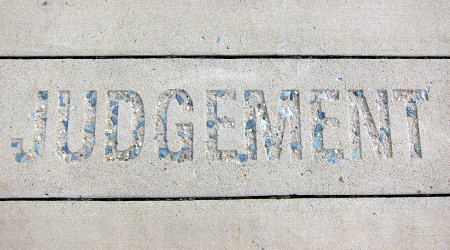What Is A Judgment On A Credit Report?

A judgment on a credit report is the result of a legal action which has been taken against you of which you are found responsible. A business, such as a mortgage company or bank, or an individual can file a civil lawsuit and if the plaintiff is awarded damages then a judgment will be rendered in their favor. At that point, the judgment and its amount appear in the "public records" section of your credit report.
When an individual owes a creditor or other lender money and does not pay the amount owed then the lender has various options to collect payment. They can continue to try collecting from the borrower, drop the matter but report the amount owed to a credit bureau, sell the debt to a third party collection agency or file a civil suit and take the consumer to court. When a civil suit is filed, the plaintiff is asking the court to rule in their favor and force you to pay them the money owed. A lawsuit is an adversarial proceeding where the plaintiff and defendant state their cases and wait for a decision. If, as the defendant, you lose the case then a judgment will be rendered in favor of the plaintiff. At this point the judgment will appear on your credit report.
Sometimes civil suits are filed in error and a judgment can appear on a credit report through no fault of your own. If this happens, consumers can challenge erroneous and inaccurate information that appears on a credit report and credit bureaus have 30 days to respond. If you are able to provide information which proves the information is inaccurate then the judgment will be removed from the credit report. If the creditor or business never provided the 30 days notice legally required giving you time to respond to the claim then they will be in violation of the Fair Debt Collections Practices Act and the case will be dismissed. If however the legal claim is valid then it behooves the consumer to contact the party in question and resolve the matter to prevent a lawsuit from being filed.
A judgment is one of the worst black marks which can appear on a credit report. It virtually guarantees an individual will be unable to obtain any forms of credit in the future including mortgages and auto loans. The belief is that if a business or creditor has to resort to suing a consumer to be paid what is owed then any other lender would be foolish to loan that person money. Judgments stay on credit reports for up to seven years if it has been resolved. If it stays as an outstanding obligation than the creditor has the option to renew the judgment in perpetuity. As an existing judgment reaches its expiration date, the person or business owed may renew the judgment by filing a motion with the court. This is how a legal judgment can haunt an individual for the rest of their natural lives.
As with any lawsuit, if you're served court papers it is important to take them seriously and address them immediately by hiring legal representation. If the claim made against you is accurate then do everything possible to work with the person or business owed and come to a resolution so the lawsuit can be dropped. Lawsuits are a time intensive and expensive option which most businesses and individuals try to avoid if at all possible. If you ignore a lawsuit the plaintiff can be awarded a default judgment which will appear on your credit report. At that point they can try to collect the judgement by garnishing wages or putting liens on your personal assets. So it's not just your credit report that is affected negatively but your whole financial life.






